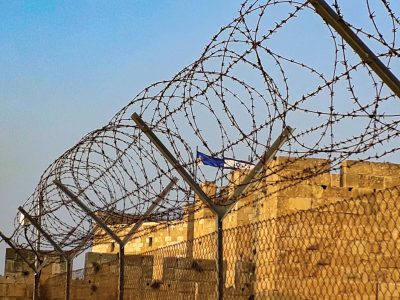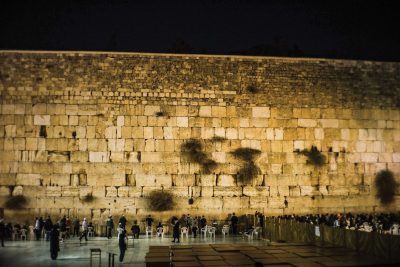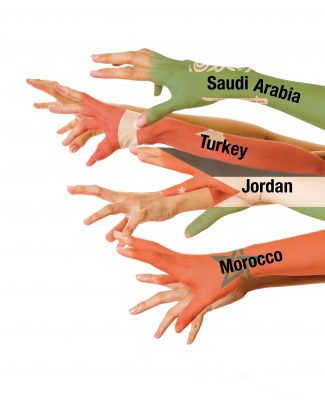×


We have detected your country as:
Please click here to go to the USA website or select another country from the dropdown list.
by: Cheryl Hauer, International Vice President
 Jerusalem is one of the most amazing cities on earth, constantly in the global public eye and a destination for millions of pilgrims every year. This is interesting, since it is certainly not the most densely populated city, with less than a million people, or even the largest, covering less than 50 miles2 (129 km2). And with an average per capita monthly income of around US $4,000, it is far from the wealthiest. Clearly the attraction is who lives here.
Jerusalem is one of the most amazing cities on earth, constantly in the global public eye and a destination for millions of pilgrims every year. This is interesting, since it is certainly not the most densely populated city, with less than a million people, or even the largest, covering less than 50 miles2 (129 km2). And with an average per capita monthly income of around US $4,000, it is far from the wealthiest. Clearly the attraction is who lives here.
The God of Abraham, Isaac and Jacob has chosen Jerusalem to be His resting place forever and the home of the people He says are the apple of His eye (Zech. 2:8). His presence and His blessing make Jerusalem a truly unique location, but unfortunately as such, it is also a target. Throughout the millennia, the enemies of God and His people have attempted to destroy the city and dethrone the King who resides there. Today, they are at it again. The rules of engagement have changed and the weapons are different, but the endgame remains the same.
A Tennis Match
Jerusalem is an ancient city, thought to be over 4,000 years old. It was originally established as an agricultural community around Gihon Spring and is believed to have been named after the Canaanite god of the dawn. It remained tiny and insignificant for centuries until King David founded the Kingdom of Judah and made the city his capital. Called the City of David, it became the home of the First Temple and the religious center for all of Israel.
Its existence, however, was anything but idyllic. Jerusalem h as been destroyed at least twice, besieged over 20 times, attacked 52 times and recaptured 44 times. Reading its history is much like watching a tennis match. It was passed back and forth between the Israelites—its rightful owners—and a host of invaders, from ancient Canaanite tribes to the Assyrians, Babylonians, Persians, Romans, Muslims and Byzantine Christians, to name a few, until finally falling to the Ottoman Empire, where it would remain for 400 years.
as been destroyed at least twice, besieged over 20 times, attacked 52 times and recaptured 44 times. Reading its history is much like watching a tennis match. It was passed back and forth between the Israelites—its rightful owners—and a host of invaders, from ancient Canaanite tribes to the Assyrians, Babylonians, Persians, Romans, Muslims and Byzantine Christians, to name a few, until finally falling to the Ottoman Empire, where it would remain for 400 years.
Unfortunately, the history of the Ottoman Empire would have a profound effect on Israel’s history as well because of the difficult and complex relationships among the Arabs of the region. The House of Saud and House of Hashim—or the Hashemites who are the ruling family in Jordan today—have clashed over property, expansion, family lineage and particularly, control of Islam’s holy sites for centuries. Ownership of the location where the Hajj (the most important ritual in all Islam—a pilgrimage to Mecca) takes place, became the symbol of Islamic leadership and was at different times controlled by both the Saudis and the Hashemites. However, the Ottoman Turks took control of the area in 1517, incurring the wrath of the other two. Both the Saudis and the Hashemites clashed with the Ottomans throughout the centuries, eventually joining forces with the British to bring down the Ottoman Empire during WWI. Though the history is extremely complex, when the dust settled at the end of the war, Turkey became an independent state, Saudi Arabia controlled the location of the Hajj and the Hashemite Kingdom of Jordan was given custodianship over the Christian and Muslim holy sites in Jerusalem, a city which had become part of Mandatory Palestine under British control. Today, nearly a century later, these agreements are still in place.
Enter President Trump
 With the mystery surrounding aspects of US President Donald Trump’s “Deal of the Century,” ancient rivalries are arising anew. Arab news outlets have reported that US foreign policy decisions have “opened yet another chapter in the long history of the competition for the guardianship over Islam’s holiest places.” Many are concerned that the US will attempt to cancel Jordanian custodianship and give Saudi Arabia supervision over Jerusalem’s holy places.
With the mystery surrounding aspects of US President Donald Trump’s “Deal of the Century,” ancient rivalries are arising anew. Arab news outlets have reported that US foreign policy decisions have “opened yet another chapter in the long history of the competition for the guardianship over Islam’s holiest places.” Many are concerned that the US will attempt to cancel Jordanian custodianship and give Saudi Arabia supervision over Jerusalem’s holy places.
Thus, the race has begun to build as much support as possible among Jerusalem’s Arab population. In April, Saudi Arabia announced a US $150 million donation in support of the holy sites and has started sending clerics and media figures to Jerusalem to strengthen relationships. In response, Jordan has stepped up its involvement, with King Abdullah even pledging US $1.4 million toward the restoration of the Church of the Holy Sepulchre. Turkey has tossed their hat in the ring as well, and their efforts are gaining momentum. Turkish funds have contributed to various reconstruction projects as well as social service and humanitarian initiatives to assist the poor. Last but not least, even Morocco has entered the fray, sending dollars and delegations to establish a presence in Jerusalem.
According to recent reports, all four of these countries have historical claims to leadership in the Muslim world, and each seems intent on becoming the major player in Jerusalem’s religious future. The outcome of the race for power is of critical importance to Israel. History has proven that whoever has custodianship over those sites controls the climate for religious liberty. One need only look back half a century to see the absence of such liberty prior to Israel’s victory in the Six Day War, when under Jordanian control, neither Jews nor Christians were allowed access to their places of religious significance. Even under the current system of Jordanian control over the holy sites, true freedom of worship is absent.
However, freedom of worship is a major tenet of Israeli democracy and even though its relationship with Jordan has been tenuous and difficult at times, the status quo has remained. There is no evidence to suggest that such a relationship would continue with a new set of players, and the outcome could be disastrous for Israel.
As we await the details of President Trump’s “Deal of the Century,” it is clear that Jerusalem, the eternal resting place of the God of Abraham, Isaac and Jacob, is indeed under siege yet again.
Photo Credit: see photos for photo credit
All logos and trademarks in this site are property of their respective owner. All other materials are property of Bridges for Peace. Copyright © 2024.
Website Site Design by J-Town Internet Services Ltd. - Based in Jerusalem and Serving the World.